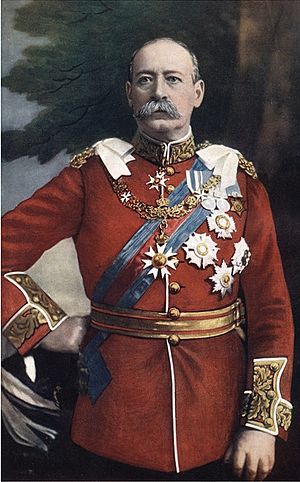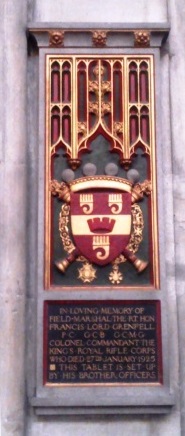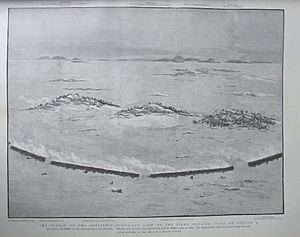Francis Grenfell, 1st Baron Grenfell facts for kids
Quick facts for kids
The Lord Grenfell
|
|
|---|---|

Lord Grenfell
|
|
| Born | 29 April 1841 Swansea, Wales |
| Died | 27 January 1925 (aged 83) Windlesham, Surrey |
| Buried |
Beaconsfield, Buckinghamshire
|
| Allegiance | |
| Service/ |
|
| Years of service | 1859–1908 |
| Rank | Field Marshal |
| Commands held | Egyptian Army 4th Army Corps Commander-in-Chief, Ireland |
| Battles/wars | 9th Xhosa War Anglo-Zulu War Anglo-Egyptian War Mahdist War |
| Awards | Knight Grand Cross of the Order of the Bath Knight Grand Cross of the Order of St Michael and St George |
| Other work | Pilgrims Society Church Lads' Brigade |
Francis Wallace Grenfell (born 29 April 1841 – died 27 January 1925) was an important officer in the British Army. He became a Field Marshal, which is the highest rank in the army.
He served in several wars, including the 9th Xhosa War, the Anglo-Zulu War, and the Anglo-Egyptian War. Later, he became the Commander-in-Chief of the Egyptian Army. He led troops in battles during the Mahdist War. After his military career, he became the Governor of Malta and then the Commander-in-Chief of the army in Ireland. He retired in 1908.
Contents
Early Life and Education
Francis Wallace Grenfell was born in Lambeth, London, on 29 April 1841. His father was Pascoe St Leger Grenfell. His mother was Catherine Anne Grenfell. He was also the grandson of Pascoe Grenfell.
He went to Milton Abbas School in Dorset. However, he decided to leave school early to start his career.
A Long Military Career
Francis Grenfell began his army career on 5 August 1859. He bought a position as an ensign in the 60th Royal Rifles. He then bought promotions to lieutenant in 1863 and captain in 1871.
In 1874, he became an aide-de-camp (a personal assistant) to Sir Arthur Cunynghame. Sir Arthur was the Commander-in-Chief in South Africa.
Fighting in South Africa
Grenfell took part in the Battle of Quintana in 1878. This was during the 9th Xhosa War. After this, he was promoted to major.
He then fought in the Anglo-Zulu War at the Battle of Ulundi in July 1879. After this, he returned to England. He became a brigade major at Shorncliffe Army Camp. Soon after, he was promoted to lieutenant colonel.
In April 1881, he went back to South Africa. He became a brigade major for an infantry brigade. He was promoted to the rank of major in July 1881.
Service in Egypt
Grenfell fought in the Anglo-Egyptian War in September 1882. He was at the Battle of Tel el-Kebir. He was promoted to colonel in November 1882. In the same year, he became an aide-de-camp to Queen Victoria.
He became the Deputy Commander-in-Chief of the Egyptian Army in late 1882. He commanded Egyptian troops during the Nile Expedition. In April 1885, he became the Commander-in-Chief (Sirdar) of the Egyptian Army.
He was honored with the Companion of the Order of the Bath in August 1885. He led his troops at the Battle of Ginnis in December 1885. He was promoted to lieutenant-colonel in January 1886. He received a higher honor, Knight Commander of the Order of the Bath, in November 1886.
He commanded forces at the Battle of Suakin in December 1888. He also led troops at the Battle of Toski in August 1889. These battles were part of the Mahdist War. He was promoted to major-general for his excellent service.
He greatly improved the Egyptian Army. Because of this, he was made a Knight Grand Cross of the Order of St Michael and St George in May 1892.
Later Commands and Retirement
After returning to England, Grenfell worked at the War Office. He was Deputy Adjutant-General in 1892. He became Inspector General of Auxiliary Forces in August 1894.
He went back to Egypt in 1897 to command the British Troops in Egypt. He was promoted to lieutenant-general in April 1898. He received another high honor, Knight Grand Cross of the Order of the Bath, in November 1898.
On 1 January 1899, he became the Governor of Malta. He served there until early 1903. In 1902, he was named a future peer. This meant he would become a Lord. He was created Baron Grenfell on 15 July 1902. He joined the House of Lords on 22 July 1902.
After returning to the United Kingdom, he commanded the 4th Army Corps in April 1903. He was promoted to full general in March 1904. He then became the Commander-in-Chief in Ireland in May 1904. He was promoted to field marshal when he retired on 11 April 1908.
He attended the funeral of King Edward VII in May 1910. He also attended the coronation of King George V in June 1911.
Other Roles and Contributions
Grenfell held several honorary positions in the army. He was a colonel for different regiments, including the 1st Surrey Volunteer Regiment. He was also colonel commandant of the King's Royal Rifle Corps.
He served as Governor and Commandant of the Church Lads' and Church Girls' Brigade. This is a youth organization, from 1908 to 1925. In 1914, he helped create a special battalion for members of the Church Lads' Brigade who wanted to join the army. He was also a founding member of the Pilgrims Society in 1902.
In 1889, his hometown of Swansea gave him the Honorary Freedom of the Borough. This is a special honor.
Francis Grenfell passed away at age 83 in Windlesham, Surrey, on 27 January 1925. He was buried at St Mary and All Saints Churchyard in Beaconsfield, Buckinghamshire.
Legacy and Naming
A road in North Kensington, London, was named Grenfell Road after him. This road later gave its name to Grenfell Tower, a building constructed in 1974.
Family Life
In 1887, Francis Grenfell married Evelyn Wood. She was the daughter of Major General Robert Blucher Wood. They did not have any children.
After his first wife passed away, he married Margaret Majendie in 1903. They had two sons and one daughter.
Honours and Awards
Francis Grenfell received many honors and decorations for his service:
- GCB: Knight Grand Cross of the Order of the Bath – awarded 15 November 1898
- GCMG: Knight Grand Cross of the Order of St Michael and St George – awarded 25 May 1892
- He received honorary degrees (LL.D.) from the University of Cambridge in May 1902 and the University of Edinburgh in July 1902.
- He was made an Honorary Freeman of Swansea in 1889.
Awards from Other Countries
Grenfell also received awards from other countries:
- He was given the Order of the Medjidie (first class) and the Order of Osmanieh (first class) from Egypt.
- He received a 'Coronation medal'.
- He was awarded the Order of the Red Eagle from Germany.
- He received the Order of Alexander Nevsky from Russia.
- He was given the Order of Saints Maurice and Lazarus from Italy.
 | Dorothy Vaughan |
 | Charles Henry Turner |
 | Hildrus Poindexter |
 | Henry Cecil McBay |



